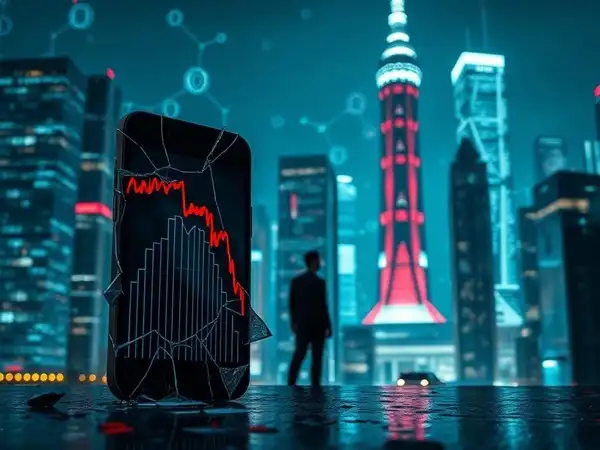Is the AI Boom Heading for a Crash? Wall Street Warns of an Overheated Market

Artificial intelligence (AI) is everywhere right now—from tech giants building massive data centers to startups racing for the latest chip deals. But behind the excitement, Wall Street is starting to sound the alarm: could the AI boom be turning into a bubble ready to burst?
UK’s Nscale and Microsoft Lead the AI Chip Race
AI hardware is at the heart of this boom. Recently, UK-based startup Nscale signed a major deal with Microsoft to supply 200,000 Nvidia AI chips. This deal is part of a larger wave of investments fueling the AI explosion, but it also highlights just how much money is pouring into AI infrastructure.
As companies like Google, Walmart, and OpenAI ramp up their AI projects, spending on AI-related chips, data centers, and software has skyrocketed. But the rapid growth is raising questions about sustainability.
Wall Street’s Warning: Is AI Stock a Bubble?
JPMorgan CEO Jamie Dimon recently gave a cautious warning to investors. He said asset prices linked to AI are extremely high, creating risks for sharp declines if things go wrong. “When asset prices are elevated, you have further to fall,” Dimon explained.
Dimon pointed out that although companies are still profitable and consumers keep spending, some valuations and credit spreads are “stretched.” He called the current situation “a category of concern” and suggested that the AI sector might be entering bubble territory.
Fund Managers Say AI Could Be the Biggest Risk
The concern isn’t just from banks. Bank of America’s latest Global Fund Manager Survey, which polls around 200 fund managers managing close to $500 billion, named an “AI equity bubble” as the top risk for the first time ever.
The survey also found that cash levels held by these managers dropped to 3.8%, dangerously close to the “sell” threshold of 3.7%. Historically, when cash holdings fall this low, it signals that investors are taking big risks just before market downturns.
Investors Still Betting Big on AI
Despite the warnings, many big investors—often called “Big Money”—are doubling down on AI. According to State Street’s Risk Appetite Index, institutional investors have been adding riskier assets for five straight months, showing strong confidence in the AI boom.
Nicholas Colas, co-founder of DataTrek Research, notes that this enthusiasm is unlikely to change unless a major shock happens. Yet, he also points to another warning sign: correlations between different market sectors have dropped to their lowest levels since the current bull market began. This often means investors are too confident, which can lead to short-term market pullbacks.
Tech Giants Pour Billions into AI – But at What Cost?
Major companies are investing billions in AI projects. Google recently announced a $15 billion data center expansion in India, its largest outside the US. Meanwhile, Walmart is partnering with OpenAI to use AI-powered retail tools.
OpenAI itself has secured major deals for chips and infrastructure from companies like Broadcom, AMD, and Nvidia, showing how the AI supply chain is growing rapidly.
Michael O’Rourke, chief market strategist at JonesTrading, sees these mega investments as signs the market is overheated. He pointed out that OpenAI’s roughly $1.5 trillion AI build-out plan far exceeds its current $13 billion in annual revenue and lack of profitability. For him, this mismatch signals a disconnect between hype and reality.
Not Everyone Sees a Bubble—Some Call It Optimism
On the other hand, some experts believe the current AI market isn’t a bubble but rather a case of “pricing to perfection.” Lale Akoner, global market analyst at eToro, says the tech sector is strong and well-backed financially.
“I wouldn’t call it an AI bubble,” she says. “Investors are optimistic and pricing in future success, but it’s not manic. These companies have strong balance sheets, and it’s more about high expectations than irrational euphoria.”
What’s Next? Big Tech’s Earnings Will Be Key
Despite mixed opinions, most agree the future depends on how companies perform financially. Analysts expect giants like Nvidia, Microsoft, and Alphabet to deliver double-digit growth through 2026, far outpacing the broader market.
Nicholas Colas warns, however, that these companies face “high bars” to meet revenue and earnings expectations. This leaves little room for surprises or disappointments, and if they fall short, it could trigger market corrections.
Conclusion: The AI Boom Is Both Opportunity and Risk
AI is clearly reshaping industries and attracting unprecedented investment. But with soaring valuations, record spending, and investor enthusiasm hitting extreme levels, signs of overheating are impossible to ignore.
Whether this will lead to a market crash or simply a correction remains uncertain. What’s clear is that investors and companies alike must watch closely as the AI revolution unfolds—and be ready for volatility ahead.
Suggested Tags:
AI bubble warning, AI stock market crash, Nvidia AI chips deal, Microsoft AI investment, Google data center expansion, OpenAI chip deals, Wall Street AI concerns, AI market risks 2025, AI investing tips

